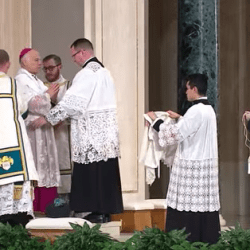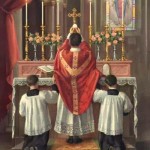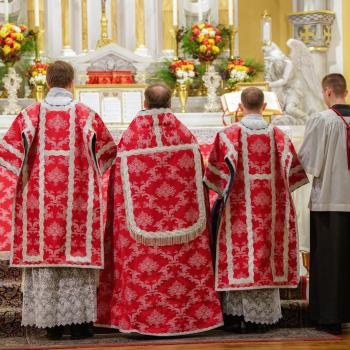And it seems a lot of Protestants are embracing the penitential practices of the season, too:
Although receiving ashes on the forehead as a visible sign of penance has been a traditional Roman Catholic practice for centuries, many Protestant denominations have adopted the tradition, too.
“Lutherans receive ashes at Ash Wednesday services,” said the Rev. Cliff Eshbach, assistant to the bishop of the Lower Susquehanna Synod of the Evangelical Lutheran Church of America.
“Our Ash Wednesday services include reflecting privately on our sins, asking God for forgiveness and coming forward for the imposition of ashes. We also ask people to pray, fast and do acts of charity.”
Members of Pine Street Presbyterian Church and Macedonia Missionary Baptist Church, both in Harrisburg, also will receive ashes on Ash Wednesday, their ministers said.
Nearly all Catholic churches will hold special Masses on March 9. During the Mass, priests will invite people to the altar to receive ashes.
Priests can intone the traditional reminder of human mortality by saying “Remember, man, that you are dust and unto dust you shall return” or newer ones such as “Turn away from sin and be faithful to the gospel.”
After Mass, Catholics head back to the world, usually with the ashes still prominent on their foreheads and a resolution to pray and do good deeds.
“Lent is a time to repent and believe in the good news,” said the Most Rev. Joseph P. McFadden, bishop of the Catholic Diocese of Harrisburg. “This year, I’d like to see Catholics give up their guilt about past failings, come to the sacrament of reconciliation and live in the newness of life in Jesus. There can be no renewal without reconciliation.”
The Rev. Russell Sullivan, pastor of Pine Street Presbyterian Church, tells his congregation to consider Lent “a time to reflect on God’s gift of salvation and our new life in Christ. It’s a time to look inwardly and think of our shortcomings and morality. It’s a time to be open to receive the gift of eternal life from God.”
Sullivan recommends taking a longer view of Lent by looking toward Easter.
“Lent prepares us for this gift that only God can give,” he said.
“We are offered bodily life again in God’s new creation.
“With Easter, the promise of resurrection inspires us to live in this world while creating a picture of what’s to come.”
Eshbach said Christians should embrace Lenten discipline, not be turned off by it.
“Change some of your practices,” he said. “Offer a bit more sacrifice. Do acts of charity to support people in your own communities and throughout the world. And be sure to pray. Reflect on your life of faith.”















